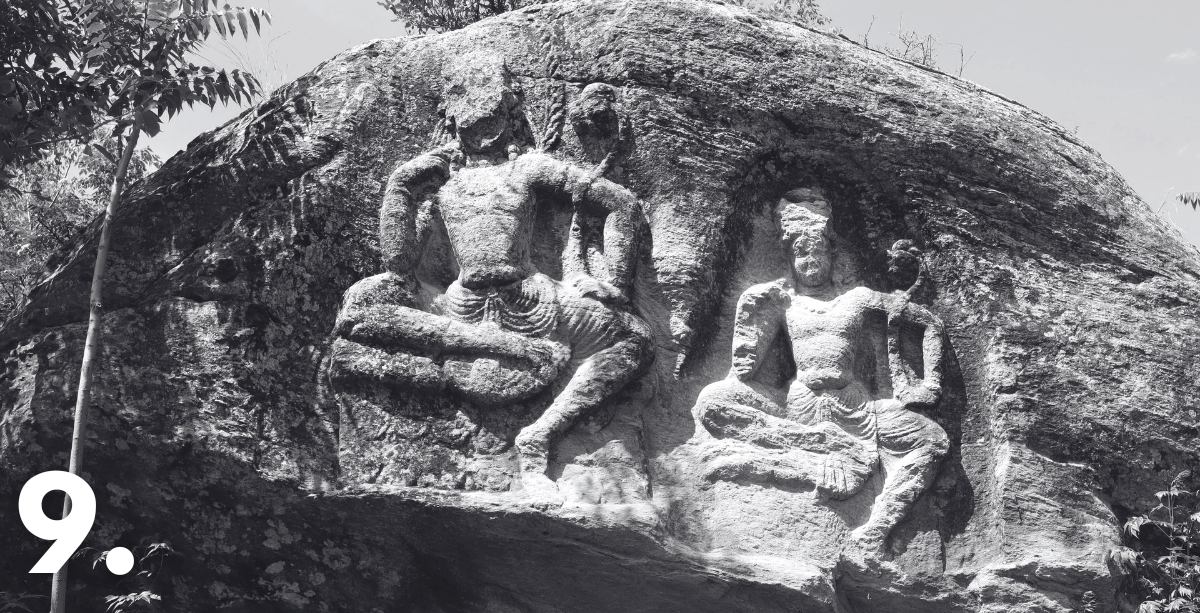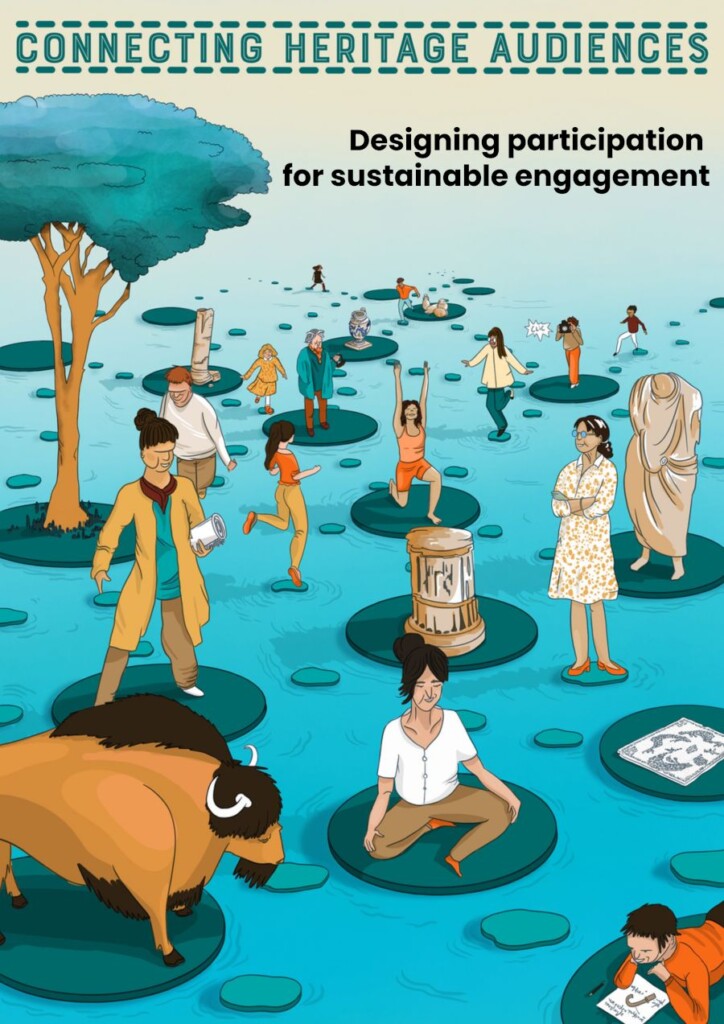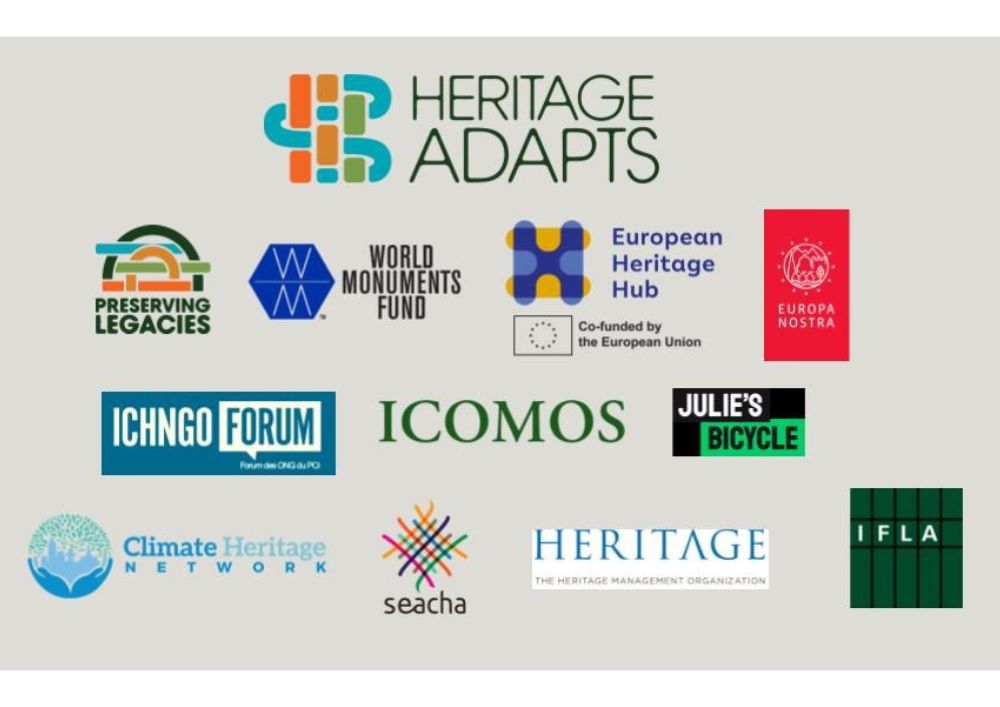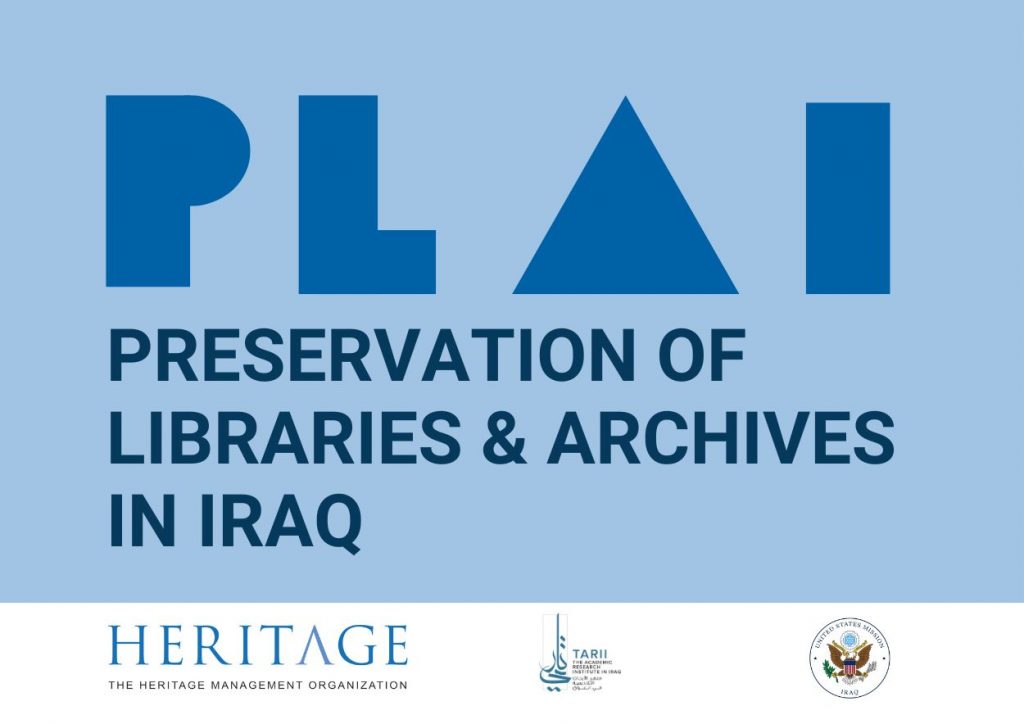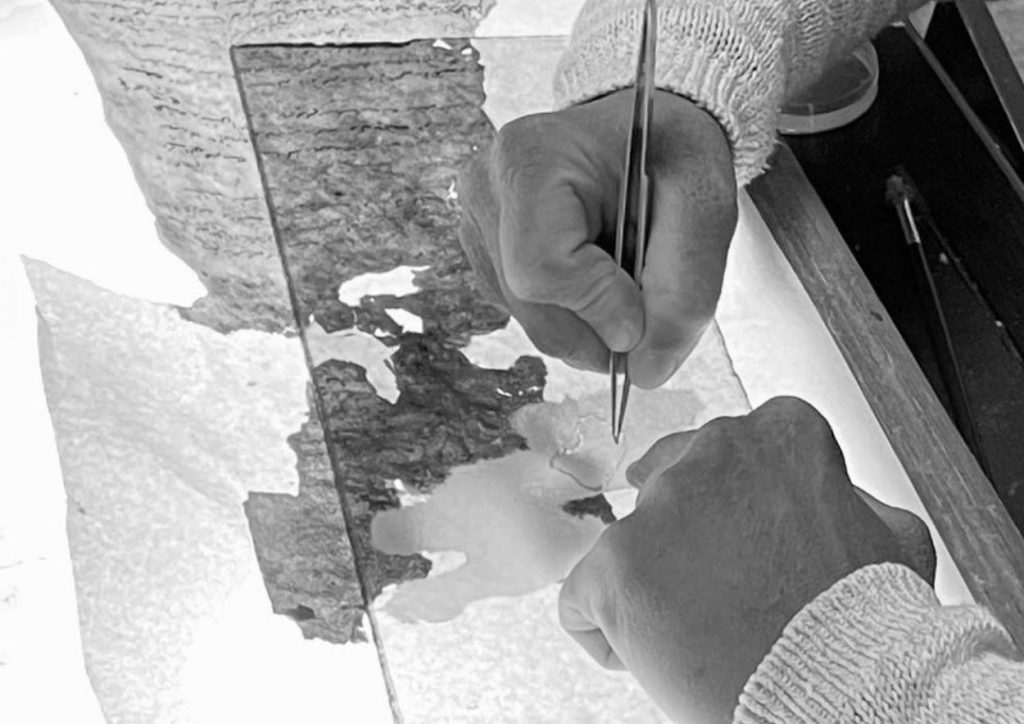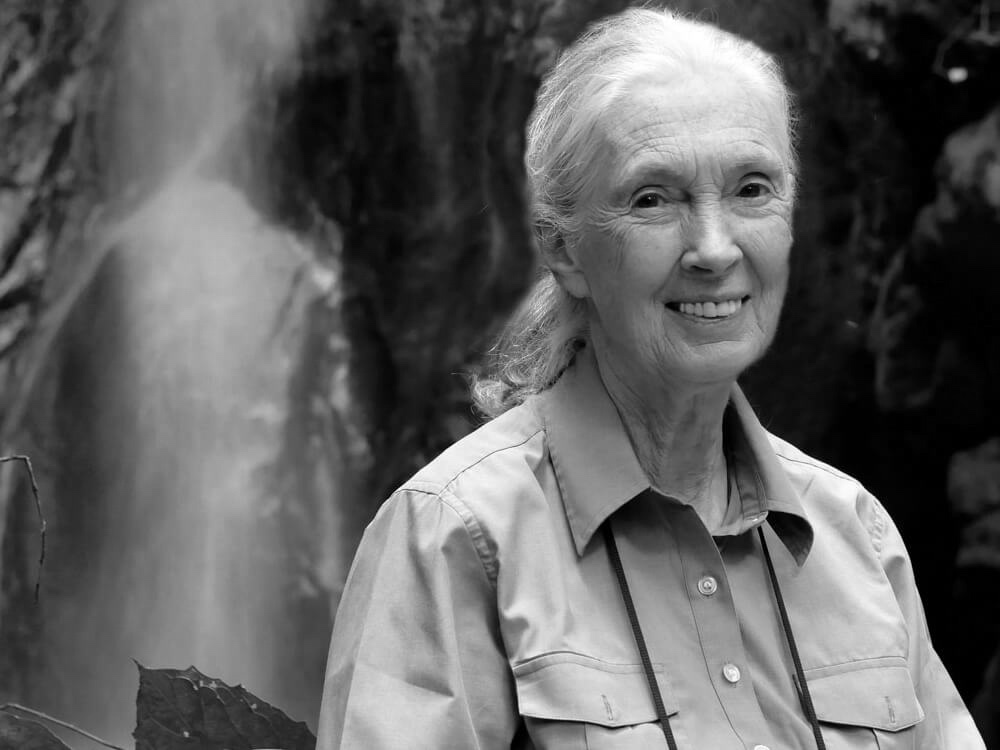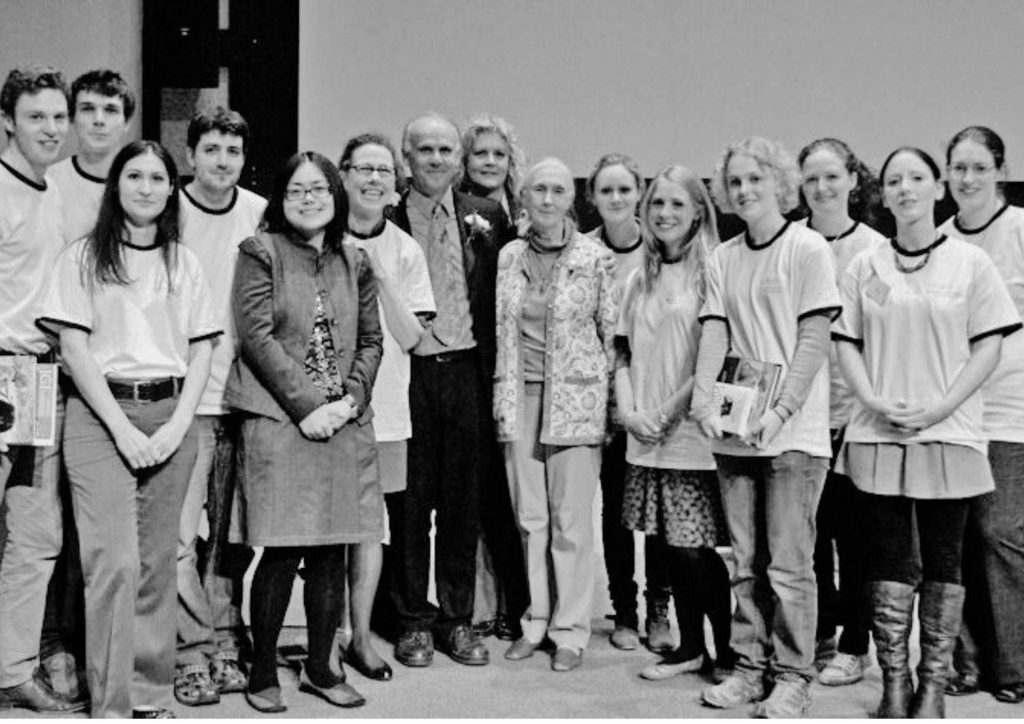: News
HERITΛGE 2025 Wrap-Up
In 2025, HERITΛGE continued to translate its mission of community-centred, inclusive, and sustainable heritage management into action across continents. From building local capacity across the world to advancing digital innovation and participatory practice in Europe and beyond, the year was defined by strong partnerships, expanded training, and tangible impact. HERITΛGE’s work in 2025 demonstrated how heritage can act as a driver of resilience, dialogue, and long-term social value, rooted in communities, connected globally, and oriented firmly toward the future.
1.The HerMaP Gambia successful completion
In February, HERITΛGE marked the successful completion of HerMaP Gambia, an initiative co-funded by the EU, by celebrating a milestone in community-driven heritage management. A certificate ceremony and visual art exhibition was held as part of The Gambia’s 60th Independence Anniversary celebrations, bringing together EU representatives, parliamentarians, and the Chair of the National Assembly to honour the dedication of the programme’s trainees. One week later, the Minister of Tourism, Members of Parliament, EU representatives, and a broad range of stakeholders convened for a high-level stakeholder lunch focused on sustaining the transformative results of the project. Already, we are seeing HerMaP Gambia graduates applying their new skills across the country—strengthening local heritage initiatives, engaging communities, and even training others. The programme’s impact is now firmly rooted in the sector, creating momentum that will shape heritage management in The Gambia for years to come.
2. HerMaP Africa: Building Capacity and Partnerships Across Three Countries
In 2025, HERITΛGE deepened its impact across Ethiopia, Ghana, and Rwanda through targeted capacity building, strategic partnerships, and close engagement with local cultural ecosystems, as part of the HerMaP Africa initiative supported by the Mellon Foundation. In Ethiopia, HERITΛGE delivered seven workshops and trained 127 participants, with a strong emphasis on hands-on, in-person conservation training. Notably, conservation workshops in Harar focused on equipping the next generation of staff from the Culture and Tourism Bureau with practical skills to safeguard this unique living heritage site, reinforcing long-term, community-based preservation. Institutional collaboration was further strengthened through the signing of two Memoranda of Understanding with key Ethiopian organisations. In Ghana, HERITΛGE delivered four workshops and trained 80 participants, ensuring broad regional representation and inclusive access to capacity building beyond major urban centres. A national networking roundtable brought together stakeholders and project leaders to exchange experiences, align priorities, and address shared challenges in the heritage sector, alongside the signing of two strategic MoUs. In Rwanda, four workshops trained 78 participants, and three MoUs were signed with leading institutions, including a milestone partnership with the Ministry of Youth and Arts. HERITΛGE also contributed to the Ubumuntu Arts Festival through programme consultations and a participatory session with young creatives, strengthening connections between heritage, contemporary culture, and youth engagement. Across all three countries, a dedicated Train-the-Trainers programme equipped 19 heritage professionals to act as HERITΛGE ambassadors, significantly amplifying local capacity and long-term impact.
3. Small Grants for African Heritage
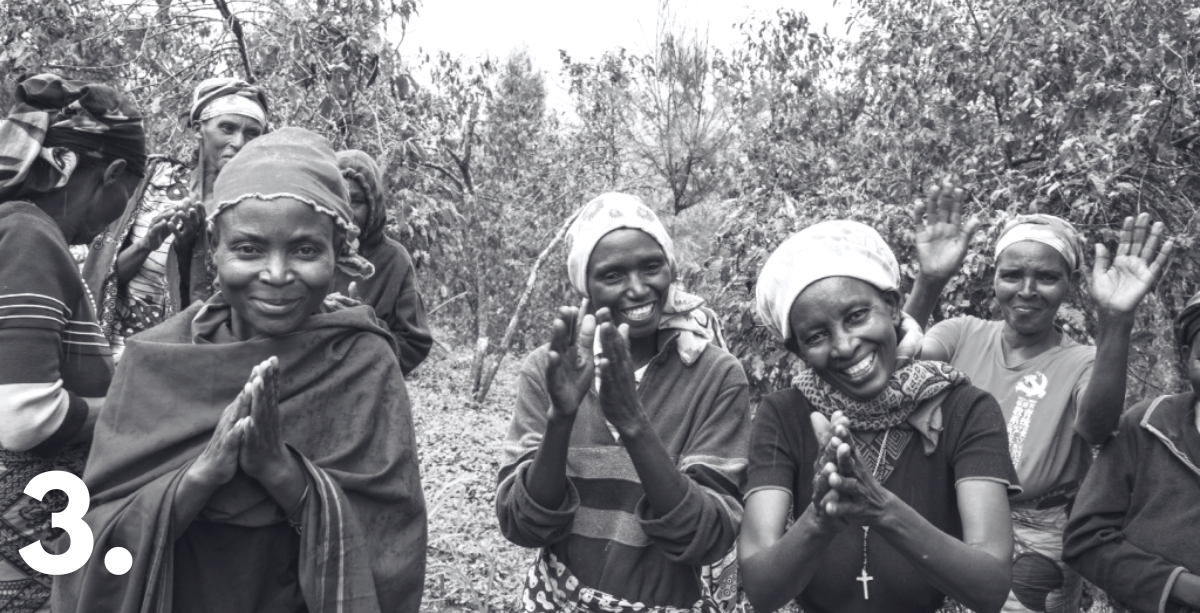 The regranting phase of HerMaP Africa reached its conclusion, marking one of the most ambitious and impactful heritage-support programmes on the continent. Since 2023, HERITΛGE has received more than 2,500 applications from across Africa and funded over 74 small heritage projects, each led by local actors working to safeguard, reinterpret, and activate their cultural heritage. This regranting initiative was made possible with the generous support of the Mellon Foundation. Throughout the year, grantees participated in six regional convenings, creating spaces to exchange experiences, strengthen their skills, and learn from peers—building a growing network of practitioners committed to community-centred heritage work. Several more convenings are planned for 2026 to continue nurturing this collaborative ecosystem. The results have been remarkable: from revitalised cultural practices to restored and more resilient cultural sites, to new opportunities for local development, these projects are already transforming lives. We are proud to showcase this work through dedicated social media features and a new publication that brings together the stories, challenges, and achievements of the HerMaP Africa grantees.
The regranting phase of HerMaP Africa reached its conclusion, marking one of the most ambitious and impactful heritage-support programmes on the continent. Since 2023, HERITΛGE has received more than 2,500 applications from across Africa and funded over 74 small heritage projects, each led by local actors working to safeguard, reinterpret, and activate their cultural heritage. This regranting initiative was made possible with the generous support of the Mellon Foundation. Throughout the year, grantees participated in six regional convenings, creating spaces to exchange experiences, strengthen their skills, and learn from peers—building a growing network of practitioners committed to community-centred heritage work. Several more convenings are planned for 2026 to continue nurturing this collaborative ecosystem. The results have been remarkable: from revitalised cultural practices to restored and more resilient cultural sites, to new opportunities for local development, these projects are already transforming lives. We are proud to showcase this work through dedicated social media features and a new publication that brings together the stories, challenges, and achievements of the HerMaP Africa grantees.
4. HerMaP Mexico: Launching a New Border Region Initiative
This year also marked the launch of HerMaP Mexico, a major new initiative that expands HERITΛGE’s work into North America and supports cultural heritage actors across Mexico’s northern border states. Funded by the Mellon Foundation’s Humanities in Place programme, the project brings a comprehensive, community-focused approach to heritage management through mapping, training, networking, and small grants. In 2025 we established the foundations of the programme: building local partnerships, initiating the mapping of heritage professionals and institutions across six states, and preparing the first round of capacity-building workshops to be delivered in both Spanish and English. HerMaP Mexico responds to the region’s unique cultural landscape—shaped by Indigenous, mestizo, migrant, and Chicano communities—and aims to strengthen local skills while creating new opportunities for collaboration and sustainable development. As the project moves forward, it will support locally led initiatives and grow into a long-term platform that connects heritage practitioners across the border region with global networks and resources.
5. Professional Training and Executive Leadership Education Programmes
HERITΛGE continued to strengthen its leadership in professional training by expanding its Executive Leadership Education programmes and reinforcing its global learning community. A key milestone was the introduction of Community Tourism and Development into the curriculum, responding to the growing need for heritage managers to understand how cultural resources can generate sustainable economic benefits while reinforcing social cohesion, identity, and community resilience. This year also saw the first alumni conference of the Engaging Communities in Cultural Heritage Summer School, bringing together former participants from around the world to share research, field experiences, and community-based practices. Alongside this, HERITΛGE successfully delivered its Conservation Series Training Programmes for the second time, expanding the offer to include First Aid for Finds and Preventive Conservation, and equipping participants with practical skills applicable across diverse heritage contexts. The Training of Trainers (ToT) programme continued to grow, building a global cohort of HERITΛGE Ambassadors—heritage professionals trained to deliver high-quality, cross-cultural capacity building within their own communities. Together, these initiatives reflect HERITΛGE’s ongoing commitment to community-centred heritage management, interdisciplinary collaboration, and the empowerment of professionals working at the intersection of culture, development, and sustainability, supported by a vibrant international network united by shared values and collective impact.
6. Advancing Audience-Centred Heritage Practice through AHEAD
In 2025, HERITΛGE advanced its work on audience-centred heritage practice through AHEAD (Accessible Heritage Experience for Audience Development), a project co-funded by Creative Europe and dedicated to strengthening participation, co-creation, and sustainability across the cultural heritage sector. At the Archaeological Museum of Messara, the project’s Greek hub, HERITΛGE hosted a series of co-creation labs in early 2025, followed by a study visit for AHEAD project partners in May, creating space for peer learning and in-depth exchange around participatory heritage approaches. In July, the 3rd AHEAD Networking Event brought together practitioners and researchers, and featured the presentation of the Living Heritage Network in Greece by Theodosia Maroutsi, highlighting how community-led approaches can be embedded in national heritage ecosystems. In September, HERITΛGE organised a dedicated Multiplier event in Athens to share the results of AHEAD with heritage managers, researchers, and cultural professionals. The project culminated in October with the presentation of AHEAD and its outcomes in Brussels and, for the Greek hub, a public event at the Archaeological Museum of Messara, where Elektra Angelopoulou, the project’s artist-in-residence, presented a site-specific artwork co-created with the local community. Alongside these events, AHEAD produced a dedicated magazine and learning resources that document the project’s insights and offer practical tools for fostering co-creation, inclusion, and long-term sustainability in cultural heritage practice.
7. SHIFT: Inclusive Digital Innovation for the Future of Cultural Heritage
HERITΛGE and its SHIFT consortium partners concluded this ambitious Horizon Europe project aimed at making cultural heritage more accessible, inclusive, and engaging through advanced technologies. Over its lifetime, SHIFT delivered a suite of innovative tools—including an Image-to-Video generator, affective speech synthesis, haptics interfaces, and a platform designed to support inclusive digital storytelling—alongside a pioneering Extended Reality (XR) Accessibility Framework. These results were tested and refined through four pilot events in Germany, Hungary, Romania, and Serbia, ensuring that the tools responded to real needs within museums, libraries, and cultural organisations. The project’s achievements were showcased at major gatherings such as the Digital Heritage World Congress and Expo in Siena, highlighting SHIFT’s contribution to the future of digital cultural heritage. As part of our commitment to long-term impact, HERITΛGE developed a set of training modules to equip cultural heritage professionals with the skills they need to adopt and apply these new technologies in their own contexts.
8. Strengthening a National Platform for Living Heritage
HERITΛGE strengthened its commitment to living heritage in Greece as a founding member of the country’s Living Heritage Network, with our Greek Programmes Manager, Theodosia Maroutsi, serving for the third year on its coordinating committee. In this role, HERITΛGE actively contributed to the Network’s 2nd National Meeting, held in Athens on 21–23 February, a major highlight of the year, where Theodosia welcomed participants and drove the dialogue during the “Living Heritage Network: Formation and Perspectives” roundtable “ reflecting on the Network’s development and future direction. HERITΛGE also delivered one of the leading side events of the 2nd National Meeting, a hands-on workshop, for 30 participants, titled “Working on the Narrative Interpretation of Living Cultural Heritage,” supporting practitioners in exploring narrative approaches to interpreting living heritage. Our impact extended well beyond the 2nd National Meeting’s floor. HERITΛGE was instrumental in drafting the Network’s Mapping Questionnaire, which was also launched in autumn of 2025. This Mapping is a crucial initiative designed to identify the essential needs of the living heritage ecosystem. The Network’s work was further amplified through HERITΛGE’s involvement in European projects: it was featured in AHEAD, where Theodosia participated in the 3rd Online Networking Event and was interviewed for the project’s magazine—freely available in English, Greek, Italian, and Spanish—and in EMPATHS, where the Network informed stakeholder mapping, cross-sector interviews, and co-design findings. Together, these activities positioned the Living Heritage Network as a key grassroots platform for participatory, community-led heritage practice in Greece and beyond.
9. Safeguarding Pakistan’s Most Significant and Vulnerable Cultural Landscapes
HERITΛGE and our partners completed the first phase of the project Preservation of Buddhist Rock Reliefs in the Swat Valley, safeguarding one of Pakistan’s most significant and vulnerable cultural landscapes. The initiative documented and conserved Buddhist rock carvings dating from the 8th to the 10th centuries, while also recording oral histories, legends, and traditional arts and crafts that link Pashtun culture with the Valley’s Buddhist past. Using advanced digital techniques, 78 rock reliefs were documented and made accessible through a public website featuring interactive maps and 3D models, and first aid conservation was carried out on 39 of the most at-risk sites. Capacity building was central to the project, with local participants trained in digital documentation and climate change adaptation. This first phase concluded with a public event at the Swat Museum and was presented internationally, including at the Lahore Museum, the Venice Biennale, and COP30, where it was cited as a strong example of heritage resilience in the face of climate change. Funded by the British Council’s Cultural Protection Fund and implemented with local and international partners, the project demonstrates how conservation, community engagement, and digital innovation can work together to protect heritage for future generations.
10. EMPATHS: Advancing Participatory Heritage Interpretation Across Europe
In 2025, HERITΛGE deepened its engagement in the Erasmus+–funded EMPATHS project, which aims to equip heritage professionals with the skills needed for participatory, community-driven heritage interpretation. Early in the year, the project contributed to international dialogue through a LDnet webinar on empowering local communities for smart and sustainable cultural heritage, while in May it published the EMPATHS Baseline Report, offering a comprehensive overview of current practices, challenges, and opportunities in participatory heritage interpretation across Europe and beyond. EMPATHS was further showcased at the European Association of Archaeologists (EAA) Congress in Belgrade, through the session “Voices of the Past, Hands of the Present: Collaborative Pathways in Archaeology and Heritage Interpretation.” In parallel, HERITΛGE led two online co-design sessions in Greece with heritage professionals from Alexandroupoli and Rizía, marking the project’s first structured dialogue between technical partners and piloting organisations and directly informing the design of the forthcoming training programme. Over the summer, EMPATHS published four key deliverables, including stakeholder mapping, cross-sector interviews, and co-design findings, all reinforcing the demand for skills in facilitation, storytelling, and emotionally resonant communication. The year culminated with the project’s second Transnational Project Meeting in Athens, where partners advanced work on the EMPATHS methodological compendium and training framework, the presentation of the project during a Global Alliance for Heritage Interpretation Webinar, and, importantly, with the publication of the EMPATHS Manifesto—a collective call to move beyond top-down interpretation and embrace heritage as a shared, democratic, and future-oriented process shaped with communities.
11. Community-Led Preservation of Earthen Architecture in Shibam, Yemen
In Yemen, HERITΛGE advanced a major effort to safeguard the cultural heritage of Shibam through the ALIPH-funded project Preserving the Unique Earthen Architecture of Shibam. In early 2025, museum experts Shatha Safi and Khulod Najjar travelled to the UNESCO World Heritage city to guide the community-led planning of a new museum that will bring together collections currently scattered across Shibam and create dedicated spaces for traditional arts, crafts, and digital learning. Their visit marked a pivotal moment in the project, with consultations held with local authorities, heritage institutions, and women from the community to ensure the museum reflects the lived experiences, history, and aspirations of Shibam’s residents. Alongside this vision-setting, HERITΛGE is training local professionals on-site, with four trainees already working with our team on the documentation of the South Palace—future home of the museum. Complemented by architectural assessments and a climate action study, the project is laying the groundwork for a resilient cultural hub that will support preservation and community engagement for years to come.
12. Safeguarding Architectural Heritage in Times of War in Ukraine
In Ukraine, HERITΛGE advanced critical work to protect architectural heritage threatened by war through the project Architectural Heritage Preservation in Times of War: The Ukrainian Model, delivered with the Kharkiv School of Architecture and 3D documentation specialists Skeiron. Launched in September 2024, the programme trained 30 students and 10 educators from across the country in cutting-edge documentation and conservation techniques—from photogrammetry and 3D laser scanning to international heritage standards—while providing hands-on field internships in Western Ukraine. Together, they created high-resolution digital records of 15 at-risk sites, safeguarding knowledge even as physical structures remain vulnerable. Through educator training and a series of public webinars, the project also planted the seeds for a new nationwide curriculum in architectural heritage preservation. Its impact extends far beyond a single academic year: it has built a cohort of young architects and teachers equipped with the skills, networks, and resolve to protect Ukraine’s cultural memory during conflict and beyond. Their work stands as a reminder that preserving heritage is not only an act of conservation, but an act of resilience and recovery.
13. New Projects for the Digital Transformation of Cultural Heritage
 In 2025, HERITΛGE became a consortium partner in two new projects funded under the EU’s Horizon Europe programme, both contributing to the ECHOES initiative and the development of the European Collaborative Cloud for Cultural Heritage (ECCCH). ECHOES aims to establish a shared digital infrastructure that brings together currently fragmented cultural heritage communities, offering access to data, advanced digital tools, scientific resources, and training materials developed collaboratively by heritage professionals and researchers. HERITΛGE participates in MusicSphere, a project dedicated to preserving and interpreting traditional musical organs—such as pipe organs and their ancient Greek counterpart, the hydraulis—through high-fidelity digital replicas, acoustic modelling, and immersive virtual and augmented reality experiences that capture both their physical structure and sonic interaction with architectural spaces. HERITΛGE is also a partner in EXCALIBUR, which focuses on burial sites, excavation contexts, artefacts, and human remains, developing human-centred, affordable digital twin technologies to support research, conservation, restoration, and museum interpretation. Together, these projects contribute to the long-term preservation, study, and public understanding of complex heritage assets, while ensuring that open, interoperable, and practitioner-driven tools are shared through the ECCCH platform for broad professional and societal impact.
In 2025, HERITΛGE became a consortium partner in two new projects funded under the EU’s Horizon Europe programme, both contributing to the ECHOES initiative and the development of the European Collaborative Cloud for Cultural Heritage (ECCCH). ECHOES aims to establish a shared digital infrastructure that brings together currently fragmented cultural heritage communities, offering access to data, advanced digital tools, scientific resources, and training materials developed collaboratively by heritage professionals and researchers. HERITΛGE participates in MusicSphere, a project dedicated to preserving and interpreting traditional musical organs—such as pipe organs and their ancient Greek counterpart, the hydraulis—through high-fidelity digital replicas, acoustic modelling, and immersive virtual and augmented reality experiences that capture both their physical structure and sonic interaction with architectural spaces. HERITΛGE is also a partner in EXCALIBUR, which focuses on burial sites, excavation contexts, artefacts, and human remains, developing human-centred, affordable digital twin technologies to support research, conservation, restoration, and museum interpretation. Together, these projects contribute to the long-term preservation, study, and public understanding of complex heritage assets, while ensuring that open, interoperable, and practitioner-driven tools are shared through the ECCCH platform for broad professional and societal impact.
New Release: The AHEAD Magazine is Now Available!
HERITΛGE is proud to be part of the EU-funded AHEAD project, and today we’re excited to share the publication of the brand-new AHEAD Magazine — a comprehensive look back at our two-year journey transforming how audiences engage with cultural heritage.
This rich publication brings together insights, case studies, and reflections from the project’s three hubs — Ostia Antica, Altamira, and Messara. It highlights how participatory design and audience-centered approaches are reshaping heritage experiences across Europe.
Inside the magazine, readers will find stories of collaboration with local communities, innovative methods for capacity building, real examples of co-creation with cultural professionals, fresh perspectives on making heritage more accessible, inclusive, and engaging
Available in English, Italian, Greek, and Spanish, the magazine offers an inspiring look into the future of heritage interpretation and audience engagement.
HERITΛGE’s Roula Gkika and Theodosia Maroutsi (the latter in her capacity as a member of the Coordinating Committee for the Living Heritage Network) contributed to this publication, along with Elektra Angelopoulou, the artist selected to collaborate with the Greek Hub at the Archaeological Museum of Messara. HERITΛGE head of Public Programs, Aris Anagnostopoulos, was part of the editorial team.
Coralie Moy was commissioned by the AHEAD team to create the magazine cover and illustrations.
Find out more and download the AHEAD Magazine here.
COP30 makes clear: culture and heritage are central to climate adaptation planning, policy and finance
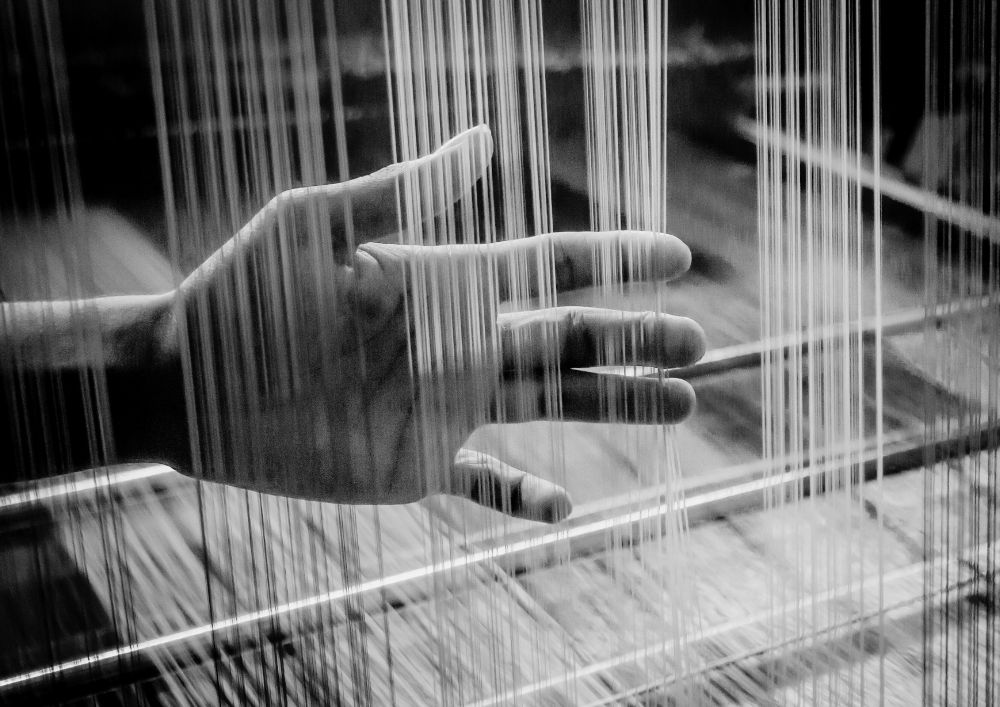 As members of the Heritage Adapts to Climate Alliance (HACA) and co-founding members of the Climate Heritage Network, HERITΛGE—together with our partners—warmly welcomes the historic developments achieved at COP30 in Belém.
As members of the Heritage Adapts to Climate Alliance (HACA) and co-founding members of the Climate Heritage Network, HERITΛGE—together with our partners—warmly welcomes the historic developments achieved at COP30 in Belém.
The placement of cultural heritage and local, traditional, and Indigenous knowledge at the heart of global climate adaptation efforts, and the adoption of five heritage indicators in the Belém Adaptation Indicators, mark a major milestone for our sector and a recognition of the vital role that communities and their heritage stewards play in building resilience to climate change.
We are proud that this achievement builds on work HERITΛGE and our partners (including ICCROM and the Canadian Conservation Institute) have been working on since 2011, when with support from SNF we launched our Cultural Heritage and Climate Change project, which led to the 2019 Athens Declaration, the Abu Dhabi pre-session and the parallel convening at the 2019 UN General Assembly—where heritage (through the Greek initiative) was first formally recognised as affected by climate change. Since then, and through successive COPs from COP26 onward, each step strengthened and refined the path toward this achievement.
COP30 now stands as a pivotal milestone in this shared endeavour. Read more in this joint statement:
COP30 makes clear: culture and heritage are central to climate adaptation planning, policy and finance
Belém, Brazil (24 November 2025) – Upon the conclusion of COP30, the Heritage Adapts to Climate Alliance (HACA) and the Heritage Adapts! 3000 x 2030 Coalition Steering Group jointly hail the historic advances in putting culture and heritage at the heart of climate adaptation secured in Belém. COP30 also saw the historic announcement of the 2026 launch of the
Heritage Adapts! 3000 x 2030 campaign to seize this momentum and support the adaptation of heritage sites and cultural practices in every community.
For the first time in the 33 year history of the UNFCCC, culture and heritage have been operationalized in international climate policy. Following two years of tireless advocacy by HACA and building on the work of the Climate Heritage Network, which began at COP26, the Global Goal on Adaptation (GGA) decision taken at COP30 makes clear that culture and heritage must be included in every dimension of adaptation, at every level.
The decision text invites all member nations to integrate the GGA’s cultural heritage and other targets into their planning processes. This critical provision is a much-needed wake-up call to all adaptation planners and policymakers to weave culture into adaptation planning at local, regional, and national levels, including National Adaptation Plans and NDCs.
It also invites the Global Environment Facility, Green Climate Fund, and the Adaptation Fund to support developing countries in implementing the cultural heritage target and other elements of the GGA. These provisions unfold against the backdrop of a broader COP30 deal on 2035 adaptation finance ambition. Culture and heritage have long been excluded from climate finance, forcing reliance on limited culture budgets to fund adaptation measures. To realize the potential of the GGA, finance organizations will need to pursue targeted partnerships with the cultural heritage sector linked to the GGA’s thematic targets.
A central element of the COP30 adaptation decision is the adoption of the 59 “Belém Adaptation Indicators” for measuring progress against the GGA’s 11 targets. The inclusion of five indicators on cultural heritage (GGA Target 9g) is an important milestone. Additional language in the decision encourages taking data from the dimensional adaptation indicators and disaggregating them by GGA theme. This has the potential to be as important for cultural heritage as the 9g indicators themselves by revealing disparities and gaps in broader GGA implementation specific to themes like cultural heritage.
The five new cultural heritage indicators measure adaptation implementation for tangible and intangible heritage, digitization, emergency preparedness, training, and community engagement. They reflect several of the key priorities championed by HACA. Victories for HACA priorities include:
● Coverage of both natural and cultural heritage sites,
● Attention to tangible and intangible heritage,
● Provision for movable heritage,
● Measuring “sustained engagement with Indigenous Peoples and/or local communities,”
● A focus on guiding by “traditional, local, or Indigenous Peoples’ knowledge and practices.”
The GGA decision encourages governments to test indicators “in consultation with relevant practitioners and other stakeholders.” Culture and heritage advocates and professionals stand ready to help lead these processes.
At the same time, the new indicator texts – written and adopted in the waning hours of COP30 – create implementation challenges. Critical issues include the failure to address ethical and equitable engagement with Indigenous Peoples and local communities whose knowledge is to be used; impractical over-use of percentage-based formulations instead of more effective direction of travel indicators; unanswered questions on how culture will be factored into other thematics including the integration of nature and culture; and inattention to maladaptation.
HACA welcomes further and continuous refinement work on the Indicators by the UNFCCC Subsidiary Bodies (SB) at SB64 in June 2026 in Bonn, as well as the new two-year Belém–Addis Vision on Adaptation Policy aimed at developing guidance for operationalizing the Belém Adaptation Indicators. These processes must be inclusive. In particular, the significant gaps in regional representation and subject matter expertise reflected in the list of cultural heritage experts previously selected by the SB Co-Chairs under the UAE-Belem Work Programme must be filled in these new processes.
HACA’s work on the GGA indicator development process was supported by a generous grant from the Mellon Foundation as part of the Climate Heritage Network’s “Imagining Low Carbon, Just, Climate Resilient Futures through Culture and Heritage” project.
Indicators alone won’t unlock adaptation action. The COP30 decision recognizes this with new mandates to the Adaptation Committee on guidance and support, as well as the new Baku Adaptation Road Map work plan on strengthening implementation of the GGA targets; enhancing knowledge-sharing; and ensuring access to means of implementation for the targets more generally. Cultural heritage voices must be included in these complex, new processes and this will require more concerted assistance than has been available in the past.
Ultimately the test of these indicators and processes will be whether they deliver additional access, finance, and support for local custodians, professionals and advocates working in their communities to protect their culture and heritage from climate change.
To meet this moment, at COP30 the Heritage Adapts! Coalition Steering Group announced the early 2026 launch of the Heritage Adapts! 3000 x 2030 Campaign, a global effort to ensure at least 3,000 cultural practices and heritage sites implement adaptive strategies by 2030. To realize this vision, the Coalition will also launch a first-of-its-kind online Community of Action. Part learning platform, part social network, the Community builds on the work of Coalition partners to democratize climate and heritage adaptation education, expand access to climate data, and foster a global peer-to-peer network.
The COP30 Presidency and the Climate High Level Champions unveiled at COP30 a new Action Agenda as a unified engine for implementation of the Paris Agreement, gathering 30 Activation Groups (including AG19: Culture, cultural heritage protection and climate action) and over 100 Plans to Accelerate Solutions (PASs) to accelerate and scale up climate solutions. The Steering Group is proud that the Heritage Adapts! Campaign has been selected as one of these PASs and will work to leverage this recognition to drive adaptation action on the ground, fulfill the ambitions of the 2023 Global Stocktake, and build towards GST2 launching at COP31.
The Heritage Adapts! campaign is being coordinated by Preserving Legacies in partnership and with support from the National Geographic Society. Initial leadership partners include the Climate Heritage Network, Europa Nostra / European Heritage Hub, the Heritage Management Organization (HERITΛGE), Working Group on ‘ICH, Climate Change and the Environment’ of the ICH NGO Forum, International Council on Monuments and Sites (ICOMOS), International Federation of Library Associations and Institutions (IFLA), Julie’s Bicycle, Southeast Asian Cultural Heritage Alliance (SEACHA), and World Monuments Fund (WMF).
Culture and heritage advocates were well represented and mobilized at COP30, working to advance culture, heritage and climate adaptation goals. They participated in more than 42 events across the negotiations space, plenary sessions, pavilions, and Green Zone. This included the “Cultural Power for Climate Action” event on 13 November where the Heritage Adapts! 3000 x 2030 was announced by HRH Princess Dana Firas of Jordan. The Heritage Adapts! Campaign was also showcased at a Workshop on Cultural Heritage and Adaptation sponsored by the Brazil Ministry of Culture and at the Paris Committee on Capacity Building’s thematic day on Culture Heritage & Arts, which focused on bridging capacity-building gaps for culture-based
climate action.
More broadly across COP30, many HACA members share the disappointment of the larger cultural and heritage community that culture was not included in the “Global Mutirão: Uniting humanity in a global mobilization against climate change” decision. This marks the first time in five years that no reference to culture or heritage was included in an overarching COP decision. In order to get on track to meeting the ambitions of the Paris Agreement, success in adaptation policy must be an anchor for embedding attention to the socio-cultural enablers of and barriers to 1.5°C climate resilience pathways across all dimensions of climate action.
Reflecting on the adaptation decision, Dr. Evangelos Kyriakidis, Director, The Heritage Management Organization (HERITΛGE) said:
HERITΛGE celebrates the placement of cultural heritage and local, traditional, and Indigenous knowledge at the heart of global climate adaptation efforts at COP30 in Belém, following sustained advocacy from the Heritage Adapts to Climate Alliance (HACA). The inclusion of five heritage indicators in the Belém Adaptation Indicators marks an important milestone, recognising the vital role that communities and their heritage stewards play in building resilience to climate change. We are proud that this achievement builds on work HERITΛGE and its partners began in 2012 with support from the SNF and honoured to continue this effort through HACA and to support the Heritage Adapts! 3000 x 2030 campaign launched at COP30.
Victoria Herrmann, Executive Director of Preserving Legacies, which serves as the secretariat of HACA and the host of the Heritage Adapts! Campaign, said:
“For the past two years, Heritage Adapts to Climate Alliance members dedicated themselves to advancing the role of culture and heritage in the Global Goal on Adaptation. Together they rose to the challenge and held the international community accountable to the promise of the GGA framework adopted at COP28. The outcomes of COP30 reflect their tireless advocacy for heritage adaptation projects to be included in climate finance and policymaking at all levels. But COP30’s progress is not enough to safeguard the thousands of places and practices that define us. Our work continues in 2026 with the launch of the Heritage Adapts! campaign and community of action to make sure every heritage place and cultural practice has a pathway to climate adaptation.”
RESPONSES FROM HERITAGE ADAPTS! COALITION PARTNERS AND SUPPORTERS
Billie Faircloth and Lori Ferriss, Co-Leads, Decarbonizing the Built Environment through Heritage Initiative, Executive Director and Research Director, Built Buildings Lab: “We applaud the Climate Heritage Network’s and HACA’s sustained advocacy leading to the COP30 landmark inclusion of cultural indicators in the GGA decision. The great strength of heritage-informed climate solutions lies in the inherent co-benefits they deliver. Protecting heritage not only improves resilience, but also demonstrates low-carbon approaches that are essential to climate change mitigation, strengthens community cohesion, and fosters a local, skills-based economy. We are honored to continue our collaboration with Heritage Adapts! through the Action Agenda to bring culture and heritage to the heart of climate action.”
Dr Cristina Garzillo Leemhuis, European Heritage Hub partner, Head of Socio-Cultural Transformations, ICLEI Europe: “Our thanks go to Heritage Adapts! for strongly advocating the essential contribution of culture and cultural heritage to climate adaptation. Local and regional leaders, planners, and policymakers are being urged more than ever to embed culture and heritage in their adaptation strategies. The inclusion of cultural indicators in the GGA decision underscores that only through the integration of culture and heritage at all levels can inclusive climate action and a sustainable future be achieved.”
Dr. Mokolade Johnson, CHN Decarbonizing the Built Environment Through Heritage Initiative Africa Lead; Co-Chair and Coordinator, Architecture & Urbanism Research Hub- University of Lagos, Nigeria: “We congratulate HACA for its coordination efforts to push ahead this agenda. The inclusion of Culture and Heritage is a heartwarming development, offering hope that initiatives such as the decarbonization voice will empower native custodians to actively implement sustainable results. A+URH-University of Lagos appreciates the encouragement and leadership that HACA and Architecture 2030 continues to provide for these achievements. The strength and success of the fluid indicators and negotiations will depend on their ability to deliver tangible gains for stakeholders working in communities that remain underheard and underserved. Strategic partnerships at every stage will hopefully provide success pathways for culture, heritage and GGA as we move towards Turkiye COP31 and beyond.”
Susan Kamenar, Preserving Legacies: “COP30 marked a milestone for heritage. From Preserving Legacies being honored as the Global Center on Adaptation’s Local Adaptation Champion for Citizen Science to heritage being elevated within the Action Agenda and the Global Goal on Adaptation, this COP underscored the growing recognition that heritage is essential to effective and equitable climate action. We are immensely proud of our team and partners, who work tirelessly to support custodians around the world in locally led heritage adaptation and to champion heritage on the global stage. Building on COP30’s momentum, we’re excited to scale our impact through the Heritage Adapts! 3000 × 2030 campaign and welcome its recognition as a Plan to Accelerate Solution, which will help us to ensure that heritage is safeguarded as a source of resilience for communities worldwide.”
Sharon Memis, Secretary General, IFLA: “COP30’s achievement of embedding culture and heritage across all dimensions of adaptation is a testament to the culture sector’s commitment to just and equitable solutions. IFLA welcomes the inclusion of movable heritage in indicators for target 9(e). Libraries safeguard heritage, history, and collective memory – and create spaces for knowledge and community. Through the Heritage Adapts! Campaign, we look forward to unlocking libraries’ capacity to strengthen resilience for themselves and the communities they serve.”
Simon Musasizi, Co-Chair, Climate Heritage Network Africa and the Arab State Region/The Cross Cultural Foundation of Uganda: “We are excited that UNFCCC is steadily recognizing the vital role of cultural heritage in adaptation and are proud to see heritage-centric initiatives on the action agenda, which align with the GCA’s call for increased ambition to protect cultural heritage and offer concrete ways to achieve that.”
Ave Paulus, Focal Point, Climate Action Working Group, ICOMOS: “Heritage Adapts campaign showcases the power of heritage to adapt – from every single heritage community and place to a global coalition of heritage people and organisations. ICOMOS is continuing to support and act within the Heritage Adapts! coalition and Climate Heritage Network for culture- and heritage-based climate action. During COP30, we have felt the strength and potential of united cultural voices in Blue zone and Green zone; we do believe the importance of culture will be fully acknowledged in the global climate action policy documents and at negotiation tables.”
Andrew Potts, Coordinator, Heritage Adapts to Climate Alliance/Preserving Legacies: “The progress made in Belem on adaptation is the result of sustained advocacy over many years by many people to bring parity to adaptation in climate policy and to culture in adaptation policy. We thank the COP26, COP27, COP28, COP29 and COP30 Presidencies for their roles in progressing the Global Goal on Adaptation to this point and I warmly congratulate the member organizations of the Climate Heritage Network and my colleagues in the Heritage Adapts to Climate Alliance for their dogged work year after year to make sure culture and heritage were included and retained in every GGA draft, at every step, at every COP.”
Alison Tickell, Director, Julie’s Bicycle (JB): “Congratulations to the HACA team and communities for the relentless advocacy of cultural practice that contributes to adaptation, community resilience and integrity. JB is thrilled to help take this work forward as a partner in the new Heritage Adapts! 3000 x 2030 campaign. Whilst there was no reference in the COP30 final text to culture, the GGA stands as a beacon for culture as a whole, the anchor that will immeasurably strengthen adaptation, and also illuminate culture’s transversal relevance to climate action generally.”
Dr. Meredith Wiggins, Senior Director of Climate Adaptation, World Monuments Fund: “The solidarity, unity, and single-mindedness of the culture and heritage sector at COP this year has been an inspiration. Culture is the missing element in climate action, and the GGA’s inclusion of heritage indicators represents a new entry point into adaptation policy and adaptation finance for experts and communities alike. WMF is grateful for HACA’s leadership, and we look forward to working as part of the Heritage Adapts! Coalition and our local partners to scale adaptation efforts, with the aim of providing feedback for SB64 and attending COP31 with measurable progress to report.”
How HERITΛGE is using Generative AI to improve cultural heritage funding
Generative Artificial Intelligence (GenAI) has taken the world by storm — transforming the way we write, design, and make decisions. But at HERITΛGE, we’re exploring how it can achieve something even more meaningful: help us understand, evaluate, and support community-led cultural heritage projects.
In 2023 HERITΛGE launched a call inviting and receiving hundreds of proposals from organizations, communities, and individuals in Africa to apply for small grants for Africa heritage projects — from traditional crafts and oral histories to sustainable tourism and cultural education. This was part of our HerMaP Africa initiative, supported by the Mellon Foundation.
The response was phenomenal. We received an unprecedented number of proposals from around the continent, over 1,700. A committee of experts was set up to examine them and decide which projects would be funded – no easy task!
To ensure that our funding decisions were fair, transparent, and data-driven, following the completion of the committee’s work, we joined forces with researchers from the Technical University of Munich (TUM) and Institute of Computer Science, Foundation for Research and Technology – Hellas (FORTH) – also our partners in the EU-funded SHIFT project, and the Group on Language, Audio, and Music (GLAM), at Imperial College London. Together, we set out to answer a simple but powerful question:
Can open, ethical AI help us make smarter and more equitable funding decisions?
The researchers, including HERITΛGE director, Dr. Evangelos Kyriakidis,introduced a framework that developed a new framework to analyze large collections of project proposals in the cultural heritage field — using a mix of established methods and the latest artificial intelligence (AI).
Our goal was to understand what themes and priorities appeared most often in proposals, and what factors might influenced their success.
To do this, we combined traditional topic modeling tools (which find recurring themes in texts) with large language models (LLMs) — the same kind of advanced AI behind tools like ChatGPT.
First, the traditional models identified broad topics across more than 1,700 project proposals focused on protecting and promoting heritage in Africa. Then, newer AI models refined these themes, helping us define them more precisely and in ways that make sense for the heritage field.
We also looked at how language was used in the proposals — for example, how complex the writing was, what tone it used (positive or negative), and whether certain patterns in language might influence how proposals are received.
This approach helped uncover hidden insights about how funding is distributed and what kinds of projects tend to succeed. Ultimately, the aim is to support more transparent and equitable funding decisions and to help cultural heritage organizations better tailor their proposals for impact.
Putting Ethics and Privacy First
While many people are familiar with AI tools like ChatGPT, these are proprietary systems that store data on external servers. When dealing with sensitive information such as grant proposals, that’s a serious concern.
Instead of sending data to the cloud, we used an open-source AI model (LLaMA3) and ran it entirely on our own secure systems. This ensured that all proposal data remained private and compliant with our ethical standards.
Finding Meaning in 1,700 Proposals
Our analysis identified 25 meaningful categories reflecting heritage priorities and emerging trends in real work on the ground in Africa— from agricultural heritage to sustainable crafts and inclusive education.
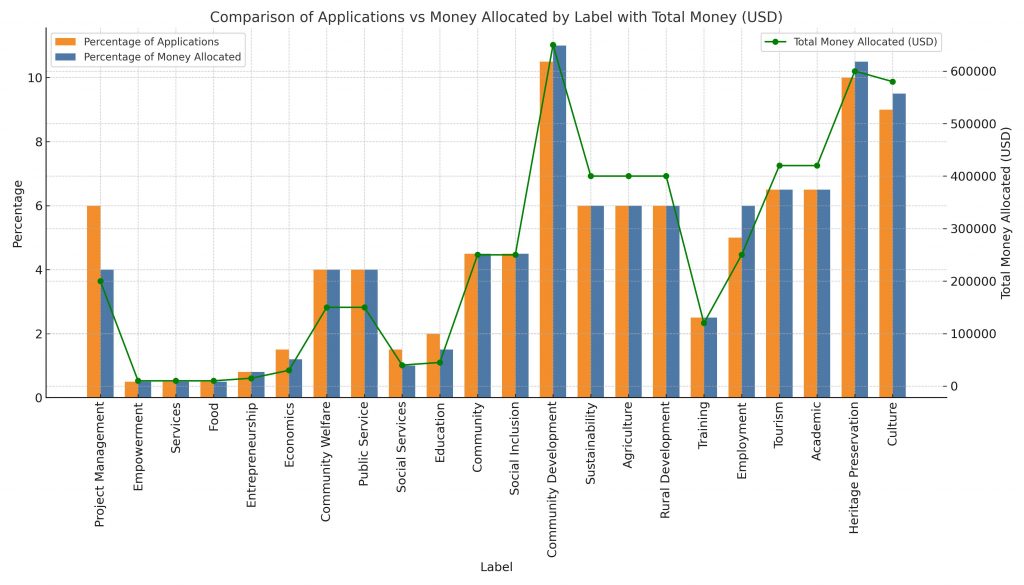 What we learnt was that Community Development, Heritage Preservation, and Culture emerged as the most common and well-funded themes. The figure below depicts how over $1 million of total allocations was apportioned among the 25 refined topics. Three leading categories—Community Development, Heritage Preservation, and Culture—each received close to $600,000. Meanwhile, areas like Social Services and Education fell below $50,000, indicating potential gaps in support.
What we learnt was that Community Development, Heritage Preservation, and Culture emerged as the most common and well-funded themes. The figure below depicts how over $1 million of total allocations was apportioned among the 25 refined topics. Three leading categories—Community Development, Heritage Preservation, and Culture—each received close to $600,000. Meanwhile, areas like Social Services and Education fell below $50,000, indicating potential gaps in support.
Interestingly, Tourism and Academic work secured comparatively large allocations despite a smaller share of total applications, highlighting a more targeted focus in these areas. Keep in mind here that applicants had to demonstrate that their project has a lasting impact, develops capacity, builds networks, strengthens local skills, and has a strong, measurable impact for the protection of heritage and the benefit of local people.
Some topics tended to appear together. Our analysis showed that strong overlaps emerged among Community Development, Culture, and Heritage Preservation, implying that community-driven initiatives often intersect with preserving local culture. Similarly, Sustainability, Conservation, and Agriculture frequently clustered, reflecting an expanding emphasis on environmentally responsible heritage initiatives. By contrast, topics like Training, Business, and Economics tended to appear in isolation—suggesting room for more integrated, cross-cutting proposals (e.g. heritage based social enterprises).
We also used sentiment analysis, readability measures, and inclusivity keywords to study the “linguistic fingerprint” of each proposal: we found that sentiment, readabilitty and inclusivity all mattered. Accepted proposals scored higher in positivity, suggesting that evaluators respond well to an upbeat, confident tone. Both successful and unsuccessful proposals were typically quite technical, indicating that complexity alone isn’t a deal-breaker. However, a moderate level of clarity—i.e., avoiding overly dense jargon—tended to correlate with better outcomes. Terms like “diversity” and “accessibility,” as well as a moderate usage of gendered pronouns, appeared more frequently in awarded projects. This underscores the value placed on inclusivity and social impact within cultural heritage funding.
In plain terms, AI confirmed that trojects using positive and inclusive language tended to perform better with evaluators, showing that tone and clarity influence evaluation outcomes. These insights can guide future applicants toward stronger, more effective proposals.
Why It Matters
By uncovering patterns in both what applicants propose and how they articulate their projects, we can provide clearer guidance for future calls and better ensure that funding reaches impactful cultural heritage initiatives.
This study shows that AI, when used ethically, can help cultural heritage professionals make funding processes more transparent, efficient, and fair. It’s not about replacing human judgment but enhancing it with better data and insights — ensuring that resources reach the initiatives with the greatest impact.
HERITΛGE and its partners will continue refining this approach as a new call for proposals for heritage projects in Mexico will soon be published, under our recently launched HerMaP Mexico initiative.
You can find the study and more information on the TUM website.
Conservation Training in Iraq
The Heritage Management Organization (HERITAGE) and The Academic Research Institute in Iraq (TARII) announce a call for applications for training in preventive conservation, project management, and fundraising.
We invite applicants in Iraq, interested in archives and libraries, to apply for this exciting training opportunity. Employees of private and religious institutions, private universities, the Ministry of Culture, and NGOs, as well as university students, are eligible to apply.
The courses, spread over 6 months, will include a two-week training in Baghdad in January 2026 and a second two-week training in Sulaymaniyah in June 2026. Between the two trainings, students will complete a project and participate in several online sessions and tutorials. Travel expenses will be provided, as well as the necessary materials to implement their practical projects at their institutions.
At the end of the training, the participants will be able to:
– independently undertake preventive conservation projects in their institutions, and train others.
– write proposals and manage projects.
To apply, please fill in the form.
The application deadline is 20 November 2025.
Contact the training team with any questions at: [email protected]
The training is provided with the support of the US Embassy in Iraq.
Honouring the Legacy of Dr. Jane Goodall
The world lost one of its greatest scientists and humanists last week. Dr. Jane Goodall transformed our understanding of what it means to be human helping us understand that we are not that as unique a species as we once thought, that our primate relatives have complex cognitive (especially communication) skills much like and expanding our understanding of ourselves and our humanity.
At the Heritage Management Organization, we pay tribute to Dr. Goodall’s life and work with profound respect and gratitude. Our organization’s long-standing engagement with Rwandan heritage professionals, and our deep interest in the history of archaeology and heritage studies as a discipline, make this moment of remembrance especially meaningful.
Below you can watch Dr. Goodall about her work in An Oral History of Primatology, part of the Personal Histories project.
The Personal Histories Project (2006 to 2016) was created by Pamela Jane Smith a researcher at the McDonald Institute for Archaeological Research. The Project was entirely student-led and funded by donations. The 2011 audio was transcribed by Cambridge undergraduates, Hannah Sainsbury, Jamie Cameron and David Kay and the 2011 film was created by film students from Goldsmith’s London, Emily Sue Shimada, Sarah McEvoy and Kostas Chrondros.








